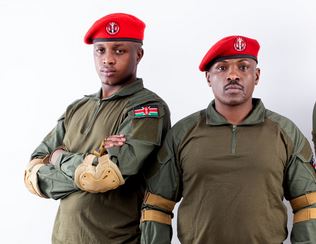

Ex-Kenya Defence Forces (KDF) officer Patrick Osoi, accused of involvement in an alleged unlawful movement, voluntarily presented himself to the authorities, a Kahawa court heard.
In proceedings before Magistrate Richard Koech at the Kahawa Law Courts on Thursday, the defence, led by lawyer Duncan Okatch, revealed that Patrick Osoi did not resist arrest, but rather approached police officers willingly after learning he was being sought.
The defence was granted the opportunity to cross-examine the investigating officer, Chief Inspector Korir, shedding light on the circumstances of Osoi’s apprehension and his subsequent cooperation.
“Upon learning that he was being sought, and after officers failed to locate him, the respondent approached them, knocked on the door of their vehicle, and identified himself,” lawyer Okatch stated.
The chief inspector, noting she was not part of the arresting team, said she had no knowledge of those exact details.
When asked if such conduct was relevant to the case, Korir agreed.
Further probing by Okatch revealed that Osoi not only surrendered himself but also cooperated fully with the officers post-arrest.
“Isn’t it true that after the arrest, he cooperated and took you through the places he lives in?” Okatch asked, to which Korir replied in the affirmative.
The defence also noted that the suspect handed over his phone and its password to the investigating officer, a move Okatch said demonstrated his commitment to assisting with investigations.
Chief Inspector Korir confirmed that the matter only came to her attention on July 28, 2025, with the state listed as the complainant.
However, she struggled to provide a specific Occurrence Book (OB) number when questioned.
The IO admitted under questioning that there was no indication Osoi attempted to flee or resist arrest.
Okatch argued that the case appeared to be grounded in suspicion rather than clear evidence, pointing out that even the alleged offences, linked to social media posts and a movement named “FBI” (Fighting Brutality and Impunity), had not been concretely substantiated.
The lawyer further questioned whether forming a movement such as “FBI” (Fighting Brutality and Impunity), aimed at addressing police misconduct, amounted to a criminal act.
In response, the investigating officer argued that there were already established agencies, including the Independent Policing Oversight Authority (IPOA), mandated to handle such issues.
Okatch, however, countered that the Constitution under Article 36 guarantees the freedom of association and that citizens are not barred from forming advocacy groups.
He further questioned which law prohibits forming a group to fight impunity, a query the officer struggled to answer.
Moreover, she acknowledged that the group allegedly formed, of which Osoi was believed to be a part, was not proscribed under the Prevention of Organised Crimes Act.
The posts in question, allegedly shared on social media, had
received widespread attention according to case documents — over 260,000 views
and thousands of engagements — but Korir could not confirm through evidence
whether the account in question belonged to Osoi.
The Directorate of Criminal Investigations confirmed the arrest of the officer alongside former prisons officer Jackson Kuria Kihara, alias Cop Shakur.












